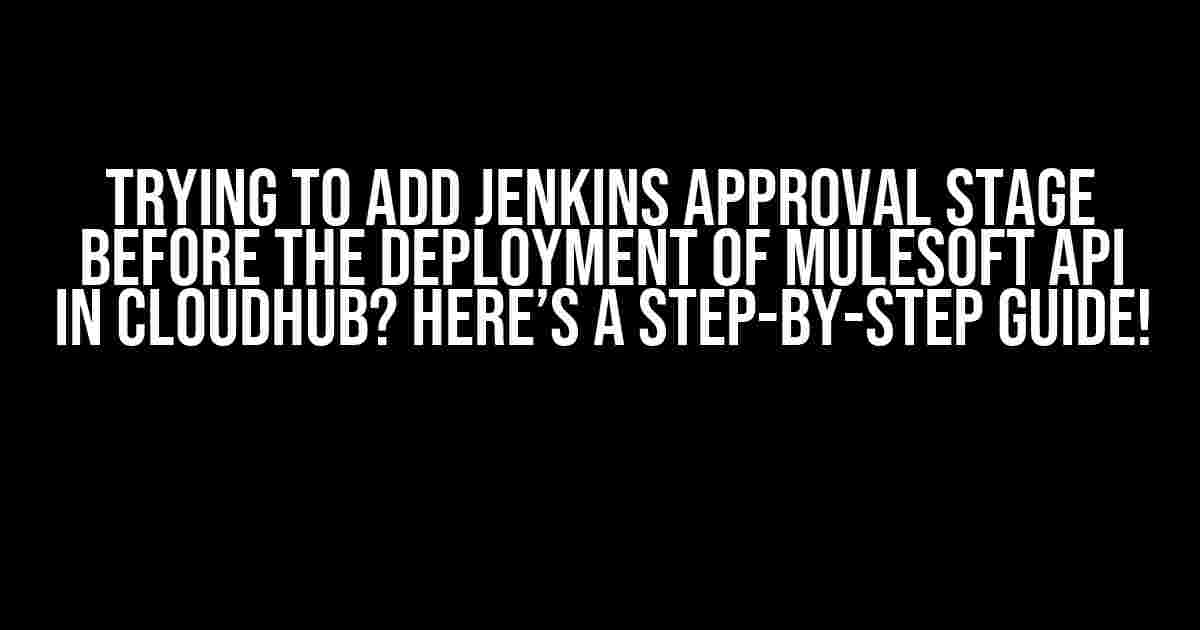Are you tired of manually tracking approvals and deployment of your MuleSoft API in CloudHub? Do you want to automate the process and ensure that only approved changes make it to production? Look no further! In this article, we’ll walk you through the process of adding a Jenkins approval stage before deploying your MuleSoft API in CloudHub.
Why Do You Need an Approval Stage?
Before we dive into the implementation details, let’s take a step back and understand why an approval stage is crucial in your CI/CD pipeline.
- Quality Assurance: An approval stage ensures that only tested and validated changes are deployed to production, reducing the risk of errors and downtime.
- Compliance: In regulated industries, approvals are essential for auditing and compliance purposes.
- Collaboration: An approval stage promotes collaboration between teams, ensuring that everyone is on the same page before changes are deployed.
Prerequisites
Before we begin, make sure you have the following prerequisites in place:
- A MuleSoft API deployed in CloudHub
- A Jenkins server set up with the necessary plugins (we’ll cover this later)
- A GitHub repository for your API code (optional but recommended)
Step 1: Configure Jenkins for CloudHub Deployment
In this step, we’ll configure Jenkins to deploy your MuleSoft API in CloudHub.
Install the following plugins in Jenkins:
mulesoft-cloudhub-pluginfor deploying to CloudHubgithub-pluginfor integrating with your GitHub repository (if using)
Configure the MuleSoft CloudHub plugin by providing your CloudHub credentials and API details:
CloudHub URL: https://anypoint.mulesoft.com Username: your-username Password: your-password API name: your-api-name API version: your-api-version Environment: your-environment
Step 2: Create an Approval Stage in Jenkins
In this step, we’ll create an approval stage in Jenkins that will gate the deployment to CloudHub.
Create a new stage in your Jenkins pipeline by adding the following code:
stage('Approval') {
input {
id: 'Approval'
message: ' Approve deployment to CloudHub?'
}
}
This will create a manual approval stage that requires a user input before proceeding to the next stage.
Step 3: Add a Deployment Stage in Jenkins
In this step, we’ll add a deployment stage that will deploy your MuleSoft API in CloudHub only after the approval stage has been successful.
Add the following code to your Jenkins pipeline:
stage('Deploy to CloudHub') {
when {
expression {
env.APPROVAL == 'Approved'
}
}
steps {
muleCloudHubDeploy(
apiUrl: 'your-api-name',
apiVersion: 'your-api-version',
environment: 'your-environment',
username: 'your-username',
password: 'your-password'
)
}
}
This stage will only execute if the approval stage has been successful (i.e., the `APPROVAL` environment variable is set to ‘Approved’).
Step 4: Configure Jenkins to Trigger the Pipeline
In this step, we’ll configure Jenkins to trigger the pipeline on changes to your GitHub repository (if using) or manually trigger the pipeline.
Configure the pipeline triggers by adding the following code:
triggers {
scm('H/5 * * * *') //Trigger the pipeline every 5 minutes
githubPush() //Trigger the pipeline on GitHub push events
}
Alternatively, you can manually trigger the pipeline by clicking the “Build Now” button in Jenkins.
Putting it all Together
Now that we’ve configured Jenkins for CloudHub deployment, created an approval stage, added a deployment stage, and configured Jenkins to trigger the pipeline, let’s put it all together!
Here’s the complete Jenkins pipeline code:
pipeline {
agent any
stages {
stage('Approval') {
input {
id: 'Approval'
message: ' Approve deployment to CloudHub?'
}
}
stage('Deploy to CloudHub') {
when {
expression {
env.APPROVAL == 'Approved'
}
}
steps {
muleCloudHubDeploy(
apiUrl: 'your-api-name',
apiVersion: 'your-api-version',
environment: 'your-environment',
username: 'your-username',
password: 'your-password'
)
}
}
}
triggers {
scm('H/5 * * * *')
githubPush()
}
}
Conclusion
In this article, we’ve shown you how to add a Jenkins approval stage before deploying your MuleSoft API in CloudHub. This setup ensures that only approved changes are deployed to production, promoting quality, compliance, and collaboration.
By following these steps, you can automate your deployment process and ensure that your API is deployed efficiently and securely.
| Step | Description |
|---|---|
| 1 | Configure Jenkins for CloudHub deployment |
| 2 | Create an approval stage in Jenkins |
| 3 | Add a deployment stage to Jenkins |
| 4 | Configure Jenkins to trigger the pipeline |
Remember to replace the placeholders with your actual API details and credentials.
Happy automating!
Frequently Asked Question
Got questions about adding Jenkins approval stage before deploying MuleSoft API in CloudHub? We’ve got answers!
Can we add a manual approval stage in Jenkins before deploying our MuleSoft API to CloudHub?
Yes, we can! You can create a manual approval stage in Jenkins by adding an ‘Input’ step to your Jenkinsfile, which will pause the pipeline and wait for manual approval before proceeding to deploy your API to CloudHub.
How do we configure Jenkins to trigger a manual approval request before deploying to CloudHub?
To configure Jenkins, you need to add a ‘Manual Approval’ step to your pipeline, followed by a ‘CloudHub Deployment’ step. You can also customize the approval request by adding a custom message or approval instructions.
What happens if someone rejects the approval request in Jenkins?
If someone rejects the approval request, the pipeline will be stopped, and the deployment to CloudHub will not proceed. You can also configure Jenkins to send a notification to the developers or stakeholders about the rejected approval request.
Can we automate the approval process in Jenkins using scripts or APIs?
Yes, you can automate the approval process using scripts or APIs. For example, you can create a script that checks for certain conditions and automatically approves or rejects the deployment. You can also use Jenkins APIs to automate the approval process programmatically.
What are the benefits of adding a manual approval stage in Jenkins before deploying to CloudHub?
The benefits of adding a manual approval stage include increased control, visibility, and security. It ensures that only approved and validated changes are deployed to CloudHub, reducing the risk of errors or security breaches.

